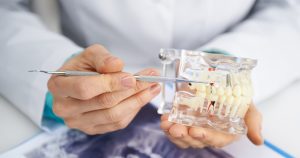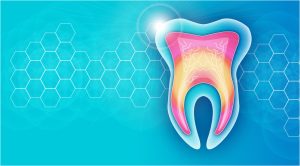In this article, we’ll discuss stem cells and dental implants and get you caught up on the latest developments in the science and medical community.
To answer your question — no, stem cells cannot currently be used to regrow, regenerate or replace missing teeth. You still need dental implants to do that.
However, research is underway and dental stem cells are showing very promising signs for future use in the regeneration and regrowth of human teeth.
In this article we’ll talk about:
- What are dental stem cells?
- Replacing teeth with dental stem cells
- Finding clinical trials for stem cells and dental implants
Keep reading to learn more about this fascinating field of research and medicine that could one day benefit you.
Can you replace teeth with stem cells?


No, teeth can’t be replaced with stem cells, at least not yet. Scientists are conducting studies and making progress in the field of stem cell dental implant research. This includes when it comes to dental stem cells for tooth replacement, repair, and regeneration for human patient use.
However, according to Volponi et al. there are still many major issues that will take time to resolve — more specifically, the identification of certain cell populations — such as epithelial cells, which line organs, vessels, and cavities to protect the body, and mesenchymal cells, which differentiate into smooth muscle, vascular, and connective tissue — that will need to be expanded in culture to provide the large quantity needed to make a tooth.
Scientists will also need to address whether the cells will be autologous (from the patient’s own body), which is more expensive but safer, or allogeneic (from a donor) which is cheaper but runs the risk of being rejected by the host body.
That is a great question and one that we debate a lot in the dental research community. On the one hand, there has been enormous progress in organ bioengineering over the past few years, so there is reason for optimism about growing an entire tooth.
However, teeth take a long time to mature, so there is an alternative school of thought that says the following: we are very good at making dental materials (to fix the hard part on the outside of the tooth), so rather than growing an entire tooth, let’s focus on regrowing the living part – the cells on the inside – and then put an artificial cap on the outside.
I think the jury is still out as to which approach will work better in the long run.
Additionally, human tooth development is very slow — creating a human tooth could take months, and even years, so much more research will be needed to figure out how to accelerate the growth of the tooth.
Implants are still the best way to replace teeth — or they would be if they weren’t too expensive for many people who need new teeth. And that’s no small number by the way — 1/4 of adults over 65 have 8 teeth or fewer, which is considered to be severe tooth loss, impacting the ability to maintain a healthy and nutrient-rich diet.
What are dental stem cells?
Stem cells are responsible for creating all of the cells in your body that have specialized functions. When you are a baby, you don’t have all of the different types of cells that your body needs. So your stem cells help you create the organs and tissues that keep your body going.


Stem cells are found in most of the body’s tissues, including in your teeth — which actually harbor a surprising amount.
The specialized cells that are formed by stem cells are called daughter cells. These daughter cells have two options — they can become more stem cells, or they can differentiate — or become specialized cells, like blood cells, bone cells, heart muscle cells, and brain cells.
Stem cells are the only cells that can form other cells and create specialized cells.
Yes – there are exciting preliminary reports of the use of DPSCs in repair of injured teeth, including revitalizing the pulp, which is particularly important because death of the pulp requires painful procedures like root canals. If we can routinely revitalize the pulp using stem cells, that would be an enormous benefit to patients.
Dental stem cells, more commonly referred to as dental pulp stem cells or DPSCs are mesenchymal stem cells. Mesenchymal stem cells are multipotent cells that are found in the bone marrow and are essential to the development of bone, cartilage, and fat.
DPSCs have the potential to regenerate dental tissue in the case of implants for a few reasons:
- They are easy to bank during surgery
- They generate tissue faster than non-dental stem cells
- They can be cryopreserved
- They have anti-inflammatory properties, facilitating the transplantation process
Stem cell dental implants clinical trials
Stem cells aren’t being used to regrow and replace missing teeth just yet – there is still a lot of research and studies needed. You may be able to find clinical trials that you can participate in. Three places you can search for clinical trials are:
- ClinicalTrials.gov: https://clinicaltrials.gov/
- World Health Organization: https://www.who.int/health-topics/clinical-trials
- ResearchMatch: https://www.researchmatch.org/
Conclusion
You can’t get stem cell dental implants just yet, but research is underway and ongoing, and chances are that in the future, dental stem cells will be used to regenerate and regrow teeth.
In the meantime, dental implants are the best way to replace missing teeth, but if that’s not an option, then consider a quality set of dentures, or more economical implant options like mini dental implants, or all-on-4s.
FAQs
Where can I get stem cell dental implants?
You can’t currently get stem cell dental implants. Research is ongoing on how to use dental stem cells to grow new teeth and replace dental implants, but there’s still a ways to go.
Can stem cells regenerate teeth?
Stem cells aren’t currently used to grow new teeth, but research is underway so that hopefully this treatment will be offered in the future. If so, stem cells could replace dental implants.
ScienceDirect: Stem cell-based biological tooth repair and regeneration. Consulted 1st December 2022.
Mayo.edu: Mesenchymal Stem Cell Biology. Consulted 1st December 2022.
CDC.gov: Tooth loss. Consulted 1st December 2o22.




